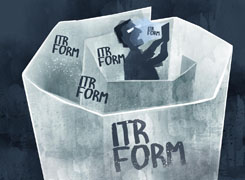What Can I Do to Secure My Retirement with 3.5 Lakhs Annual Expenses?
Ramalingam Kalirajan |8319 Answers |Ask -Follow
Mutual Funds, Financial Planning Expert - Answered on Jul 15, 2024
He has an MBA in finance from the University of Madras and is a certified financial planner.
He is the director and chief financial planner at Holistic Investment, a Chennai-based firm that offers financial planning and wealth management advice.... more
.jpg)
Hi, I am 38 years old, and my monthly salary after tax is 1.58 lakhs. I have term life insurance with a monthly premium of Rs. 3800, Health insurance of 10 lakhs with family monthly premium Rs. 1833 and life insurance for self, spouse and 3 years daughter monthly premiums Rs. 8750. I live in a rented apartment. Contingency fund 5 lakhs. What can I do to plan for my retirement? My current annual expenses are around 6 lakhs and I have no credit.
Assessing Your Insurance Coverage
Your term life insurance is a great start. It ensures financial protection for your family in case of an unfortunate event. The health insurance coverage of Rs. 10 lakhs is also adequate for a family of three. However, the life insurance policies for yourself, your spouse, and your daughter with a monthly premium of Rs. 8750 might not be the most efficient use of your funds.
Insurance cum investment policies generally offer lower returns compared to other investment options. It would be wise to surrender these policies and consider investing the money in more profitable avenues.
Evaluating Your Contingency Fund
You have a contingency fund of Rs. 5 lakhs, which is a good safety net. This amount is approximately equivalent to 10 months of your current annual expenses. It provides a cushion against any unforeseen expenses or emergencies.
Setting Retirement Goals
Your current annual expenses are Rs. 6 lakhs. Assuming a modest annual inflation rate, these expenses will increase over time. You need to plan for a retirement corpus that can sustain these increasing expenses.
Investment Strategy for Retirement
Importance of Diversification
Diversification is key to managing risk and ensuring steady returns. It involves spreading your investments across various asset classes like equity, debt, and gold. This helps in balancing the risk and returns of your portfolio.
Equity Investments
Equity investments can offer high returns over the long term. You can invest in mutual funds through a certified financial planner (CFP). Actively managed funds are preferable as they can potentially outperform the market.
Debt Investments
Debt investments provide stability and regular income. They are less volatile compared to equity investments. You can consider investing in debt mutual funds, which are managed by professionals and offer better returns than traditional fixed deposits.
Gold Investments
Gold is a good hedge against inflation and currency devaluation. Investing a small portion of your portfolio in gold can provide stability during economic downturns.
Avoiding Direct Funds
Direct funds might seem attractive due to lower expenses. However, they require constant monitoring and financial expertise. Investing through a CFP can ensure that your portfolio is regularly reviewed and rebalanced.
Regular Monitoring and Review
Investing is not a one-time activity. Regular monitoring and review of your portfolio are essential to ensure that it aligns with your financial goals. A CFP can provide valuable insights and make necessary adjustments to your investment strategy.
Tax Planning
Effective tax planning can help you save a significant amount of money. Make sure to utilize tax-saving investment options under Section 80C, 80D, and other relevant sections of the Income Tax Act. This will not only reduce your tax liability but also help in building a substantial corpus for your retirement.
Section 80C
Under Section 80C, you can claim deductions on investments like Employee Provident Fund (EPF), Public Provident Fund (PPF), National Savings Certificate (NSC), and equity-linked saving schemes (ELSS).
Section 80D
Under Section 80D, you can claim deductions on health insurance premiums. Ensure that you are maximizing these deductions to reduce your taxable income.
Importance of Discipline and Patience
Disciplined investing and patience are crucial for building a substantial retirement corpus. Avoid making impulsive decisions based on market fluctuations. Stick to your investment plan and review it periodically with your CFP.
Final Insights
Planning for retirement requires a comprehensive approach. You need to assess your current financial situation, set clear goals, and invest in a diversified portfolio. Regular monitoring, tax planning, and disciplined investing are essential for achieving your retirement goals.
By following these steps, you can build a secure financial future for yourself and your family.
Best Regards,
K. Ramalingam, MBA, CFP,
Chief Financial Planner,
www.holisticinvestment.in
You may like to see similar questions and answers below
Ramalingam Kalirajan |8319 Answers |Ask -Follow
Mutual Funds, Financial Planning Expert - Answered on Jun 11, 2024
Ramalingam Kalirajan |8319 Answers |Ask -Follow
Mutual Funds, Financial Planning Expert - Answered on Jun 11, 2024
Ramalingam Kalirajan |8319 Answers |Ask -Follow
Mutual Funds, Financial Planning Expert - Answered on Jul 03, 2024
Ramalingam Kalirajan |8319 Answers |Ask -Follow
Mutual Funds, Financial Planning Expert - Answered on Oct 09, 2024
Prof Suvasish Mukhopadhyay |612 Answers |Ask -Follow
Career Counsellor - Answered on May 05, 2025
Prof Suvasish Mukhopadhyay |612 Answers |Ask -Follow
Career Counsellor - Answered on May 05, 2025
Mihir Tanna |1052 Answers |Ask -Follow
Tax Expert - Answered on May 05, 2025
Samraat Jadhav |2269 Answers |Ask -Follow
Stock Market Expert - Answered on May 05, 2025
Samraat Jadhav |2269 Answers |Ask -Follow
Stock Market Expert - Answered on May 05, 2025
Samraat Jadhav |2269 Answers |Ask -Follow
Stock Market Expert - Answered on May 05, 2025
Ramalingam Kalirajan |8319 Answers |Ask -Follow
Mutual Funds, Financial Planning Expert - Answered on May 05, 2025
Prof Suvasish Mukhopadhyay |612 Answers |Ask -Follow
Career Counsellor - Answered on May 05, 2025
Prof Suvasish Mukhopadhyay |612 Answers |Ask -Follow
Career Counsellor - Answered on May 05, 2025
Radheshyam Zanwar |1595 Answers |Ask -Follow
MHT-CET, IIT-JEE, NEET-UG Expert - Answered on May 05, 2025
























